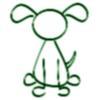 Vigorous and alert, this powerful and agile breed is a native of France. A working animal, the breed’s most common job has been herding, but their acute sense of hearing also makes them an excellent watchdog. The Briard is an ancient breed of large herding dog. During the First World War, the Briard was used, almost to the point of extinction, by the French Army as a sentry, messenger, and to search for wounded soldiers. The Briard’s modern-day roles include police, military and search-and-rescue work, as well as companion dog.
Vigorous and alert, this powerful and agile breed is a native of France. A working animal, the breed’s most common job has been herding, but their acute sense of hearing also makes them an excellent watchdog. The Briard is an ancient breed of large herding dog. During the First World War, the Briard was used, almost to the point of extinction, by the French Army as a sentry, messenger, and to search for wounded soldiers. The Briard’s modern-day roles include police, military and search-and-rescue work, as well as companion dog.
The Briard originated in France and can be dated back to the 8th century. He was known as the Chien Berger De Brie, which is believed to be derived from his place of origin, the region of Brie (although the Briard was found in many parts of France). A more romantic explanation exists as well — that is, the name is a distortion of Chien d’Aubry. A 14th century legend claims that Aubry de Montdidier, a courtier of King Charles V, built a cathedral in memory of a valiant Briard who saved his son’s life.
Regardless of the origin of the name, the Briard can be linked back to the Emperor Charlemagne through his depiction in early tapestries. The Briard has also been linked to Napoleon and was the official breed of the French Army.
Physical wise, Briard is a large, powerful herding dog.
Head – large, long and rectangular in shape
Muzzle – wide, has a long mustache and beard
Stop – well marked
Nose – square-shaped, black with open nostrils
Teeth – meet in a scissors bite
Eyes – large, set wide apart, come in black or black-brown with very dark pigmentation along the rims; covered with hair which cascades to the rest of the body
Ears – either cropped or left natural, set high, not lying flat to the head
Legs – powerful with strong bone
Tail – well-feathered, low-cut tail has a J-shaped crook at the end
Feet- large, compact and round
In males, the body is about the same length as the height, but in females the length may be slightly longer. The Briard has a double coat. The outer coat is coarse, hard and dry, lying flat and falling naturally in long, slightly wavy locks. The undercoat is fine and tight all over the body. Coat comes in all colors except for white. Adult coats are 6 or more inches (16 cm) long, giving the dog a bushy look with a shaggy beard, eyebrows and mustache.
Prev1 of 3Next
